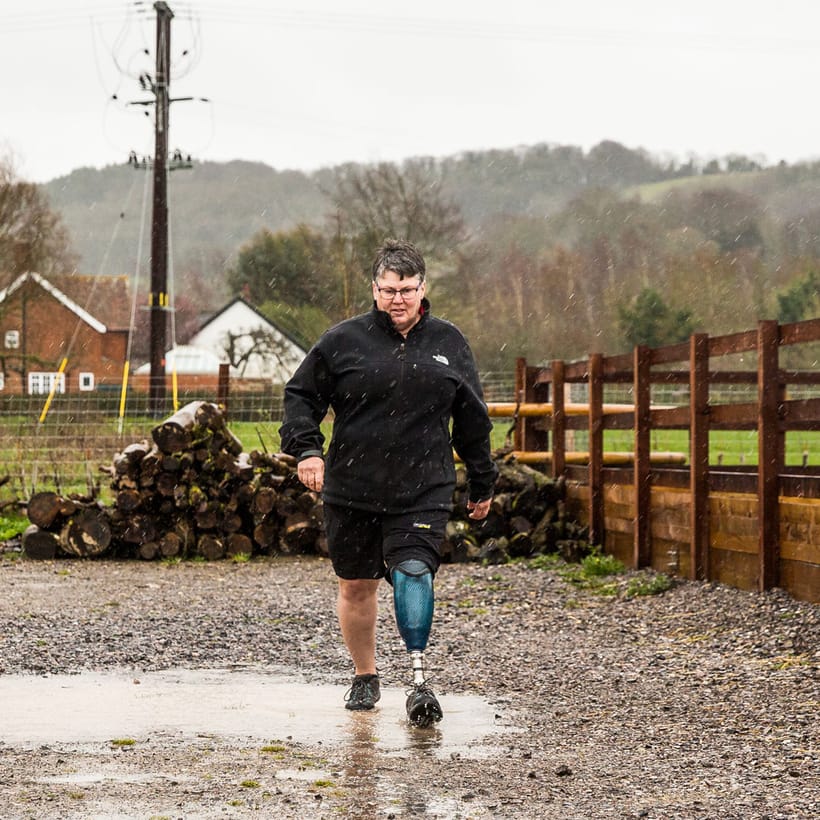The Power of Hiking
Posted on Monday, February 13, 2023
If you’re able to go for a hike, the benefits are highly rewarding.

Hiking is one of the most approachable forms of exercise, especially for amputees with a prosthesis. The barrier of entry is extremely low, with minimal starting equipment. The main thing that is required is a little preparation.
There are huge benefits to hiking, not just for your physical fitness, but for your mental wellbeing as well. There’s a measurable feeling of triumph after summiting a cliff or mountain, wind rushing past you, and the world opening beneath you. On top of the final moment of exhilaration is the natural high you experience along the way from an intense level of exercise taken outdoors.
Hiking is a great all-body workout. The variable terrain trains your balance and works out your core using stabilising muscles that are often underutilised. Additionally, it makes sense to bring along a day pack to carry supplies for longer hikes, creating a weighted experience to help strengthen various muscles. Because hiking is a cardio exercise, it can help reduce the risk of heart disease, stroke, high blood pressure, high cholesterol and even some cancers.
All exercise is good for the brain, and regular exercise is the best way to prevent dementia. “Physical exercise can grow and promote grey matter retention and thickness in important regions of the brain, like the hippocampus and prefrontal cortex,” explains Dr Sarah C. McEwen, a cognitive psychologist and senior research scientist at the Pacific Neuroscience Institute at Providence Saint John’s Health Centre. Add on top of that exercising outside and your brain starts to use different skills like learning, memory, and navigation throughout your hike.
When you hike outdoors, it becomes a powerful tool for destressing. People who spent 50 minutes walking through nature reported less anxiety and more happiness compared with those who walked near traffic, according to a study in the journal Landscape and Urban Planning. For those just starting out, even five minutes in nature can boost your mood and self-esteem, according to a study by the University of Essex in England. It’s a great excuse to get out there and touch grass.
Now, before you bolt out the door, there are some tips to keep in mind before a hike, especially for amputees. One of the first things to do is to check with your doctor and prosthetist to ensure that your body is healthy and the prosthesis you wear are ready for a hike. It’s possible your prosthetist will need to make some adjustments beforehand. Additionally, it’s best to take a few short walks, about 1K or so, to help toughen your residual limb to reduce proneness to swelling, chafes, cracks, rashes, and other insults. It also gives you the chance to check your gear, break in your footwear, and test your prosthesis.
Some additional tips to keep in mind is the equipment you want to bring along. For shoes, you may not need giant clunky ankle-high boots, but you definitely want footwear that’s rated for trails or running to offer enough support. Additionally, hiking poles have become more fashionable and help tremendously to maintain balance and shift the burden from your lower body. For longer, more challenging hikes, here’s a list to keep in mind:
- Map
- Sun protection
- Headlamp or flashlight
- First-aid supplies
- Snacks
- Water
- Fire-starting equipment
- Emergency shelter, like a tent
- Change of clothes
- Extra set of socks/liners
Finally, it’s more fun to go with a friend. It’s great bonding when everyone is working towards a unified goal, like reaching the summit or finding an idyllic destination in the woods. Plus, it’s good sense to bring along a pair of crutches to leave in the car in case the worst should happen, and your prosthesis breaks down. A friend can go back and retrieve the crutches to make sure you get back on your own strength. If you don’t have an immediate hiking buddy, you can always check local hiking groups through the Meetup app or check out Facebook for hiking groups to allow you to find like-minded companions.
More articles
-

Vidscrip offers a visual way to connect remotely with your prosthetist
PROSTHETICS PROSTHETISTPosted on Friday, April 12, 2024 , in Prosthetics
-

How the combination of hydraulics, microprocessors, and waterproof materials create more choices for amputees
HYDRAULICS MICROPROCESSORS WATERPROOF AMPUTEEPosted on Friday, April 12, 2024 , in Prosthetics
-

The future of prosthetics has a clear starting point
PROSTHETICSPosted on Friday, April 12, 2024 , in Prosthetics